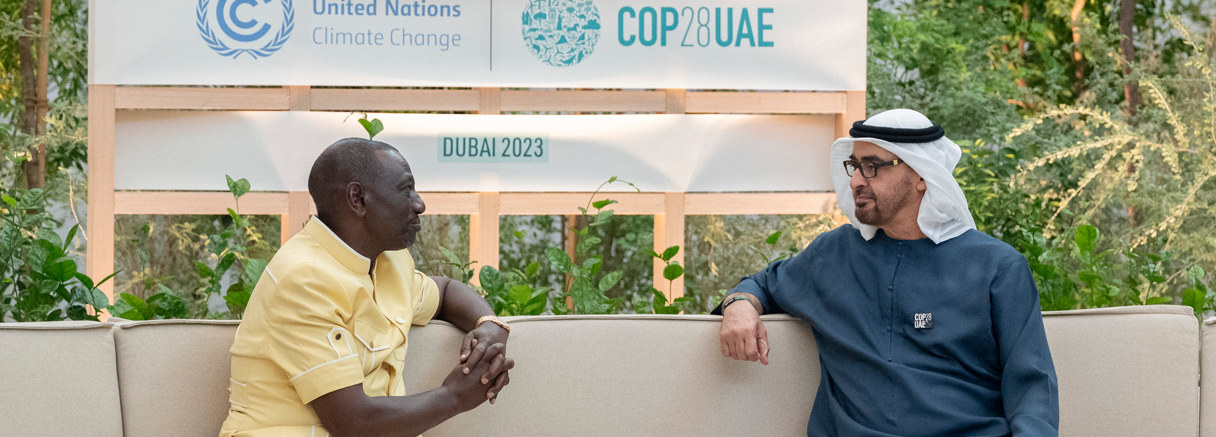President Ruto speaks for Africa as he calls for a global carbon tax

President William Ruto has urged the world to prioritise addressing the devastating impact of climate change on the continent and called for a new global carbon tax to finance mitigation and adaptation measures.
Speaking at the world’s biggest climate summit, the COP28, in Dubai, United Arab Emirates, President Ruto, who is also the current chair of the Committee of African Heads of State and Government on Climate Change, said Africa is doing its part in mitigating the impacts of the climate crisis despite the fact that the Global South is the least polluter.
“As Africa, we are ready to play our part in full,” said the President, “The Nairobi Declaration, which we adopted at the conclusion of the first Africa Climate Summit, sets out the vision and a pathway for Africa to be a vital part of the global solution to the existential climate challenge we face. The Declaration captures the consensus of the African government leaders for climate-positive growth that harnesses our ample human and natural resources.”
He added that it commits nations to triple renewable energy capacity, establish green manufacturing, halt and reverse deforestation, promote sustainable agriculture, promote nature-based solutions, support the global call to phase down coal plants and eliminate inefficient fossil fuel production subsidies, and further amplify calls for a new global financial architecture and global carbon tax.
At the talks, Mr Ruto is pushing for a package of ambitious energy transition and investment goals and incentives, aligned with the global commitment of maintaining global temperatures within a 1.5 degrees Celsius limit. This, he says, entails a pledge to triple renewable energy capacity and double energy efficiency by 2030, alongside a significant reduction in fossil fuel dependency.
“Notably, the vision demands deliberate support for developing countries. In the past two decades, only two per cent of the three trillion dollars invested globally in
renewable energy has reached Africa, despite the continent's vast resource endowment and great need for investment,” he said, adding, “The consequences of this investment gap are starkly evident: more than 600 million Africans are deprived of basic energy services, which are fundamental to dignified living and access to essential services such as healthcare and education. The challenge is compounded by the fact that nearly one billion people in Africa do not have access to clean cooking amenities.”
Speaking about the effects of climate change on Kenyan people and economies, President Ruto told global leaders that the country has been besieged by relentless torrents that have claimed lives and displaced thousands of people.
“The ensuing injury, loss and damage extends beyond immense human toll, to the destruction of vital infrastructure and the disruption of critical supply chains across many vital sectors,” he noted, adding that beyond mere logistical challenges, the devastation further complicates the daily struggle for survival for many households and communities.
He pointed out that latest UN data shows that unless there is a significant and radical shift in global economic and industrial patterns, “mankind is hurtling at a perilous
velocity on a trajectory towards the dire scenario of a world that is warmer by 3 degrees Celsius.”
“The evidence is alarming,” he warned, “In just the first 10 months of this year, we experienced 86 days where temperatures soared over 1.5 degrees Celcius above pre-industrial levels. Adding to this worrying scenario is the fact that global greenhouse gas emissions have not decreased, rather increased by a deeply worrying 1.2 per cent between 2021 and 2022, culminating in a staggering 57.4 gigatonnes of CO2 equivalent, a record high that underscores the magnitude of the climate crisis we face. We must add that all the increases were experienced in the G20 countries.”
He further reminded delegates that the climate crisis must never be seen as a distant threat.
“It is here, now, indiscriminately devastating nations regardless of their size or wealth, and thereby reshaping our world in profound, unprecedented and highly complicated ways. A stark illustration of this disastrous turn of events is currently unfolding in Eastern Africa, where catastrophic flooding has swiftly followed the most severe drought the region has seen in over 40 years. Scientific evidence clearly and strongly links these extreme weather events to human-induced climate change. Studies indicate that droughts are now at least 100 times more likely in parts of Africa than they were in
the pre-industrial era. This translates into a dramatic reduction in long-term rainfall, while short-term rainfall patterns remain erratic and unpredictable.”
While lauding the President’s sentiments during an interview on the sidelines of the global meet, Environment, Climate Change and Forestry CS, Soipan Tuya, said that Kenya intends to maintain its global leadership in climate action and will be working closely with African and other leaders to support the COP Presidency deliver its ambitious goals.
“This is why the negotiators under the technical coordination of the Ministry of Environment, Climate Change and Forestry have developed a position paper to guide negotiations under different agenda items,” CS Soipan Tuya said, adding that the African Leaders Nairobi Declaration on a Climate Change outlines how feasible, effective, and low-hanging options for climate mitigation and adaptation are already at the disposal of the world from the African continent, and only require accessible capital and technology to realise.
Ms Tuya also noted that for Kenya, the main agenda at COP28 involves resource mobilisation.